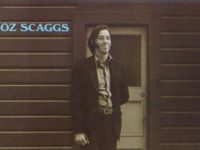Since his career went supernova with Silk Degrees, Boz Scaggs has continued to hone his craft, digging deeper into the blues, employing broader jazz brushstrokes — and nowhere is that fine tuning more obvious than on his terrific new album.
Memphis, newly issued on 429 Records, finds Scaggs moving with deceptive ease across this musical landscape, with the added wrinkle of holding sessions in the studio where Al Green put down some of his sleekest, sultriest, nasty grooving-est sides. Together with producer Steve Jordan, Scaggs has released one of his finest albums.
He stopped by for an exclusive Something Else! Sitdown to talk about Memphis, his Dukes of September project with Donald Fagen and Michael McDonald, and about returning with a new-found sense of determination and joy after a lay off in the 1980s …
NICK DERISO: This new album has the feel of an overview, as you touch on every stage of your career from blues to blue-eyed soul, even orchestral pop. It feels like the most complete performance you’ve made so far as a vocalist.
BOZ SCAGGS: That’s an interesting point. As far as vocals go, this one was unique because the intent was primarily to give my voice a setting. Every song was very knowingly chosen to be something that would be very, very comfortable, very easy, very straight forward for me to sing. The others might have featured songs more, or a theme, or in the case where I made a couple of jazzy albums that were definitely not easy to get comfortable with. They were very challenging. This one is totally comfortable, vocally. I think you made a very good observation there. My albums are always going to have some blues, and some R&B, some rock and some jazzy undertones. It’s not intentional, but that’s sort of the range of things.
NICK DERISO: What was it like inside of Al Green’s old studio? Did you find yourself all of a sudden feeling funkier?
BOZ SCAGGS: Definitely. It’s in an neighborhood in Memphis, a real neighborhood. The people that run the studio, for them it’s all about the emotion and the spirit that you can put into a song. It’s about how you feel when you approach your music, and being very close to something. It’s got a groove, and you find yourself inside that. It definitely lends itself to getting a soulful performance.
NICK DERISO: There’s a moment when you dip into your lowest register on the old Tony Joe White song “Rainy Night in Georgia,” that stopped me in my tracks. You’re still reaching new places in your approach to a lyric.
BOZ SCAGGS: That was done at like 2 or 3 o’clock in the morning. I had been singing all day, and my throat was tired but it was open. We dropped it from a key of E, where we had done it in demos, to a key of D — because it just felt really resonant with that step down. Although it’s a very imperfect voice, and I normally would have cleaned it up — just resung it until I got it right — Steve Jordan, the producer, didn’t want me to touch it. He said: “It says what it needs to say.”
[SOMETHING ELSE! REWIND: Though ‘Memphis’ was recorded in the same spot as some legendarily funky Al Green sides, Boz Scaggs’ roving muse simply won’t allow him to make a genre record.]
NICK DERISO: It’s got a very dark, after-midnight feel. I guess that’s why.
BOZ SCAGGS: I discovered that lower range when I did a standards album in ’03, with a traditional jazz quartet. That was the first time I tried to get comfortable in that range. Normally, in my early days with rhythm-and-blues and rock stuff, on albums like Silk Degrees and before that, I tried to keep a song in the upper range to give it power and intensity. That changed after I started working in a lower range, about 12 years ago with the Dig album and then when I got to that jazzy stuff, I really went to work on that mid and lower range. I found that there was something there, a kind of expression and a kind of emotion that I’d not really used before. I find it very rich, and resonant, like some of the instruments that love — like acoustic guitars and cellos.
NICK DERISO: Your on-going concert series with Donald Fagen and Michael McDonald represents the first time that you’ve been part of a group since the early days with Steve Miller. What’s it been like going back into the band dynamic?
BOZ SCAGGS: We already have a pretty defined individual style, and coming together as we have after covering so much of our own ground is about the commonality that we share. It’s just a joy. We don’t have to convince each other of anything. There’s so much material that we have in common that’s it’s just a joy to choose it, and rehearse it and see what works. It’s almost like any number can win. It’s great musical territory. I think I can speak for the three of us when I say: We wouldn’t do it, if it became anything less than a joy.
[SOMETHING ELSE! REWIND: Boz Scaggs joined Steely Dan svengali Donald Fagen and former Doobie Brothers frontman Michael McDonald for a summer tour that turned into a baby boomer rave up.]
NICK DERISO: Is your association with Fagen responsible for the inclusion of Steely Dan’s “Pearl of the Quarter” on the new album?
BOZ SCAGGS: In an indirect way. I have been a Steely Dan fan for a long time, but I hadn’t listened to that album lately. The weekend before I went down to Memphis to start my record, I went to see Jon Herington, the guitar player with the Dukes of September and with Steely Dan. He has also worked on tour with me for a number of years. So, I went down to see Jon at a small club in New York with his band, and he did that song. I was so taken by it that I pulled it out of the hat when we got into the studio. Jordan liked it. So, there we were. Again, I’m going to use the same phrase, it was like any number could win. Once we had recorded a few songs, the first ones, we knew we were in the right place, and it sounded great. We were just in the mood to try some things. Jordan pulled out “Love on a Two Way Street,” which I hadn’t heard since it hit how many ever years ago. But I said: “Sure, let’s try it.” I think it was in that spirit that we ran through a number of those songs: “Why not? It’s a great song, it’s fun to sing, it’s different. Let’s do it.”
NICK DERISO: It was around the time of Silk Degrees that you went from being a guitarist who sang toward a new musical persona as a vocalist who also played a little guitar. Was that always a goal?
BOZ SCAGGS: (Laughs.) That sort of happened when I started working with studio musicians. It’s very intimidating, to me, to be around the best musicians of my age, the best ones in the LA studio scene. Really, the songs and the arrangements that I was doing at that time were beyond my technical capacity to play.
[SOMETHING ELSE! REWIND: We explored outside of ‘Silk Degrees’ in Boz Scaggs’ lengthy catalog, from his bluesier fare to one of those psychedelic Steve Miller sides to some boffo bossa nova.]
NICK DERISO: You were largely absent in the 1980s. Did you have some crisis of faith in what you were doing? What convinced you to return to the business?
BOZ SCAGGS: It was a combination of things. It’s an enormous question, and the answer is very complex. I’ve answered it a lot of times, and I think I would have to answer it differently each time. It was personal matters, and the creative urge in me had disappeared. I had a young family. I hadn’t intended to take all of that time off, but once I got away from it, I found little reason to go back to it. I had worked pretty intensely for the decade of the ’70s, and I felt every day was a work day. It was hard for me to get used to the notion that there were other things going on in my life that could supersede that. But, after some time, I just went into other places. It’s a simple answer, but it was a very complex time.
NICK DERISO: What’s different now? What’s convinced you that this is the right place to be again?
BOZ SCAGGS: The songs came back to me. Most musicians, there’s a song, a rhythm or a groove — something going on in your head. It’s like an itch that has to be scratched. It just came back to me. As it is now, I just love being where I am, and I feel lucky to be doing what I’m doing. There are many projects to do, and lots of musicians to work with — and I’m very happy. I think that I had forgotten at some point, or didn’t realize, that this is really who I am and what I do. It had become a chore to me. But now, this is what I love to do. I get to wake up and be a musician.
- How Deep Cuts on ‘Music From Big Pink’ Underscore the Band’s Triumph - July 31, 2023
- How ‘Islands’ Signaled the Sad End of the Band’s Five-Man Edition - March 15, 2022
- The Band’s ‘Christmas Must Be Tonight’ Remains an Unjustly Overlooked Holiday Classic - December 25, 2016




